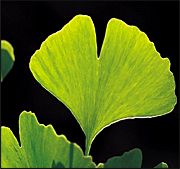One of the longest nerves in the body is known as the vagus nerve (VN). The VN is the 10th pair of cranial nerves that originates at the brain stem in the medulla oblongata. This nerve is part of the parasympathetic nervous system, which is a part of the ANS. Research suggests ear acupuncture can activate the VN.
Herbs & Botanicals
Ginkgo biloba (yin xing yi)
What is ginkgo biloba? What is it used for?
Ginkgo is one of the oldest and adaptable species of trees in existence.
Ginkgo biloba trees existed before the Ice Age; some trees even survived the atomic blast at Hiroshima in 1945.A single ginkgo biloba tree can live as long as 1,000 years and grow to a height of 120 feet. It has short branches with fan-shaped lives and produces an inedible fruit (but an edible inner seed).
Ginkgo biloba extract (GBE) is produced from the tree's leaves.
It is one of the best researched herbal medicines on record, with more than 400 published studies conducted on GBE. It is the most frequently prescribed herbal medicine in Germany and France and is rapidly becoming one of the most used herbal medicines in the U.S. Ginkgo biloba extract increases circulation to the brain and the
extremities. It makes platelets less sticky, which helps prevent
embolisms and artherosclerosis. By increasing blood flow to the
brain, ginkgo biloba may prevent mental deterioration and dementia
in elderly patients; some small studies have shown that GBE may
slow (or even stop) the progression of Alzheimer's disease.
Ginkgo biloba extract increases circulation to the brain and the
extremities. It makes platelets less sticky, which helps prevent
embolisms and artherosclerosis. By increasing blood flow to the
brain, ginkgo biloba may prevent mental deterioration and dementia
in elderly patients; some small studies have shown that GBE may
slow (or even stop) the progression of Alzheimer's disease.
Because of its ability to improve circulation, GBE has been used for a variety of vascular conditions, including Raynaud's syndrome, impotence caused by impaired blood flow, and claudication in the legs. There is some evidence that GBE may also reduce some symptoms of PMS, including fluid retention, congestion and breast tenderness.
How much ginkgo biloba should I take?
Most practitioners recommend taking 120 milligrams daily, in two or three divided doses of 50:1 extract standardized to 24% flavone glycosides. For more serious cases of dementia of Alzheimer's, up to 240 milligrams may be taken.
What forms of ginkgo biloba are available?
Dried ginkgo biloba is available in capsule form. GBE is also found in tinctures and fluid extracts. Make sure that ginkgo biloba products are standardiced to contain 24% flavone glycosides and 6% terpene lactones.
What can happen if I take too much ginkgo biloba? Are there any interactions I should be aware of? What precautions should I take?
When taken in recommended doses, ginkgo biloba is very safe; however, there have been isolated cases of gastrointestinal disorders, headaches and dizziness in patients taking excess amounts. Because it decreases the effectiveness of platelet aggregation, it should not be taken with blood-thinning agents such as coumadin or warfarin.
Because there is a lack of data concerning GBE's effects during pregnancy, it should be used with caution by pregnant and lactating women. Ginkgo biloba should not be given to children and infants.
As with all supplements, patients should consult with a health care provider before taking ginkgo biloba.References
- Bauer U. Six-month double-blind randomized clinical trial of ginkgo biloba extract versus placebo in two parallel groups of patients suffering from peripheral arterial insufficiency. Arzneimittelforschung 1984;34:716—720.
- Castelli D, Colin L, Camel E, et al. Pretreatment of skin with a ginkgo biloba extract/sodium carboxymethyl-b-1,3-glucan formulation appears to inhibit the elicitation of allergic contact dermatitis in man. Contact Dermatitis 1998;38(3):123—126.
- Chung KF, McCusker M, Page CP, et al. Effect of a ginkgoloide mixture (BN52063) in antagonizing skin and platelet responses to platelet-activating factor in man. Lancet 1987;1(1):248—250.
- Le Bars PL, Katz MM, Berman N, Itil TM, Freedman AM, Schatzberg AF. A placebo-controlled, double-blind, randomized trial of an extract of ginkgo biloba for dementia. JAMA 1997;278:1327—1332.
- Ramassamy C, Christen Y, Clostre F, et al. The ginkgo biloba extract, EGB761, increases synaptosomal uptake of 5-hydroxytryptamine in-vitro and ex-vivo studies. J Pharm Pharmacol 1992;44:943—945.


